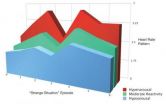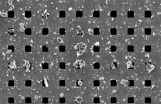(Press-News.org) MIAMA BEACH, FL (October 5, 2011)––Approximately 10-20 percent of prostate cancer patients have a family history of the disease. There are three major factors that are used to evaluate the extent and aggressiveness of prostate cancer, help make treatment decisions, and estimate prognosis: the Prostate Specific Antigen Level (PSA), Gleason score (GS) from the biopsy, and the digital rectal exam findings (DRE). However, men with a family history of prostate cancer have often been feared to have a more aggressive form of the disease not otherwise represented by these three factors and therefore are sometimes urged to undergo more aggressive treatment.
Now, Mark Buyyounouski, M.D., M.S., a radiation oncologist at Fox Chase, reports that men with a family history of prostate cancer should expect equally good outcomes following radiotherapy for prostate cancer as patients without a family history. Buyyounouski will be introducing the new data at the 53rd annual meeting of the American Society of Radiation Oncology on Wednesday, October 5th.
PSA, GS, and DRE are well established risk factors for prostate cancer that are used everyday to help make decisions about what treatment option may be best for a patient with the disease. These factors appear in both the American Joint Cancer Commission (AJCC) and National Comprehensive Cancer Network (NCCN) model to stratify risk of recurrence and guide treatment. Yet, in some instances, physicians use a family history of prostate cancer to evaluate the degree of risk associated with the cancer and recommend more aggressive treatment.
In the study, Buyyounouski and his team of collaborators examined 1,711 men who received three-dimensional conformal (3DCRT) or intensity modulated radiotherapy (IMRT) between 1989 and 2007 at Fox Chase Cancer Center in Philadelphia. A positive family history was defined as any prostate cancer in one or more first-degree relatives. Twenty-eight percent of the patients had a positive family history for prostate cancer. The median follow-up from completion of treatment was 71 months.
"What we learned was that whether the men had a history of prostate cancer or not, all had equivalent PSA controls, freedom from metastasis, recurrence-free survival, and overall survival," says Buyyounouski. "Patients should feel comfortable knowing that when they receive radiotherapy having a history of prostate cancer in the family doesn't compromise the results. This is important because patients, especially those with a family history, might assume that radiotherapy might not work as well and opt for surgery when it may not be necessary."
Interestingly, Buyyounouski and his colleagues also learned that men with a family history of prostate cancer were more likely to be younger, have a lower PSA, and non-palpable disease.
"This study shows that patients with a family history are being screened and diagnosed with prostate cancer earlier. Careful screening may have contributed to the good results we observed."
###
Study co-authors include Hilary Bagshaw, Karen Ruth, Eric M. Horwitz, and David Chen from.
Fox Chase Cancer Center is one of the leading cancer research and treatment centers in the United States. Founded in 1904 in Philadelphia as one of the nation's first cancer hospitals, Fox Chase was also among the first institutions to be designated a National Cancer Institute Comprehensive Cancer Center in 1974. Fox Chase researchers have won the highest awards in their fields, including two Nobel Prizes. Fox Chase physicians are also routinely recognized in national rankings, and the Center's nursing program has received the Magnet status for excellence three consecutive times. Today, Fox Chase conducts a broad array of nationally competitive basic, translational, and clinical research, with special programs in cancer prevention, detection, survivorship, and community outreach. For more information, visit Fox Chase's Web site at www.foxchase.org or call 1-888-FOX CHASE or (1-888-369-2427).
END
Advanced imaging with Positron Emission Tomography (PET) scans shows great promise in predicting which patients with inoperable lung cancer have more aggressive tumors and need additional treatment following standard chemotherapy/radiation therapy, according to new research.
Mitch Machtay, MD, of the Seidman Cancer Center at University Hospitals (UH) Case Medical Center and principle investigator for the study, presented the significant data today at 2 pm at the annual meeting of the American Society for Radiation Oncology (ASTRO) in Miami Beach, Fla. The National Cancer ...
In these hard economic times, many couples are sticking together solely because of perceived monetary impediments to divorce. With the right help, however, you may not have to choose between happiness and financial wellbeing.
Divorce and the Economy
According to a study conducted by the University of Virginia, nearly 40 percent of married couples who were planning on a divorce or separation before the recession put their divorce on hold once the economy crashed. While the choice to abandon the pursuit of a divorce is no doubt complex and there are multiple reasons ...
In the best of circumstances, raising a toddler is a daunting undertaking. But parents under long-term stress often find it particularly challenging to tap into the patience, responsiveness, and energy required for effective child rearing.
Now research from a University of Rochester team helps to explain why chronic stress and parenting are such a toxic mix. The study finds that ongoing strains, like poverty or depression, disrupt the body's natural stress response, making mothers more likely to engage in a host of problematic parenting behaviors, including neglect, ...
In 2010, more than 2,000 businesses went through an immigration audit. And this year, ICE has already audited many more companies, including sending out 1,000 notification letters to businesses in early June alone. In a time when employers have enough to worry about, they must also make concerted efforts to ensure their employees are legally qualified to work in the U.S.
Under the Obama administration, the focus on illegal immigration has moved from undocumented immigrants to their potential employers. Gone are the days of loud immigration raids like the ones we saw ...
COLUMBUS, Ohio – Researchers recently isolated 63 unique dust particles from their laboratory – and that's just the beginning.
The chemists were testing a new kind of sensor when dust got stuck inside it, and they discovered that they could measure the composition of single dust particles.
In a recent issue of The Journal of Physical Chemistry C, they describe how the discovery could aid the study respiratory diseases caused by airborne particles.
Most dust is natural in origin, explained James Coe, professor of chemistry at Ohio State University. The 63 particles ...
Property rights are one of the essential tenets of our society. According to one California eminent domain attorney, property owners are entitled to use their property how they see fit within the bounds of the law. However, there are instances where the government is entitled to infringe upon one's property to support the greater good of the community. This is called eminent domain.
Under the principle of eminent domain, it is the government's right to "take" private property for public use. When a "taking" occurs, a municipality must pay fair market ...
The sluggish economy is not only affecting job growth in the United States, it is also spurring more debt due to medical expenses. According to study conducted by the Commonwealth Fund, 57 percent of workers who lost jobs that previously had health insurance have become uninsured. This creates two problems for those who become sick: Not only do they no longer have health insurance to defray medical expenses, they also lack the income to pay such costs out of pocket.
The Commonwealth Fund also found that debt collection companies contacted 30 million Americans in 2010 ...
CAMBRIDGE, Mass. -- Technology firms frequently require workers to sign non-compete agreements, which typically bar their employees from joining rival companies for one to two years. For firms, the agreements keep workers from taking the knowledge and skills they have acquired and using them to help a rival.
But a new study of more than 1,000 engineers, conducted by an MIT professor, shows that non-compete agreements come with a high cost for employees: When those workers do shift jobs, roughly one-third of them end up leaving their chosen industry altogether, often ...
Over the past few years, a movement to reform spousal support (called "alimony" and "spousal maintenance" in some states) has been making its way across the nation. Spousal support in its traditional form consists of the money-earning spouse providing financial support to the other spouse after a divorce. The amount of spousal support can be agreed upon or calculated based on the earning spouse's ability to pay and the needs of the non-earning spouse.
Because of changing times -- in which more and more wives and mothers work outside the home -- many ...
The Great Recession and the currently tepid economic recovery swelled the ranks of American households confronting hunger and food insecurity by 30 percent. In 2010 48.8 million Americans lived in food insecure households, meaning they were hungry or faced food insecurity at some point during the year. That's 12 million more people than faced hunger in 2007, before the recession, and represents 16.1 percent of the U.S. population.
Yet hunger is not readily seen in America. We see neither newscasts showing small American children with distended bellies nor legions of thin, ...

